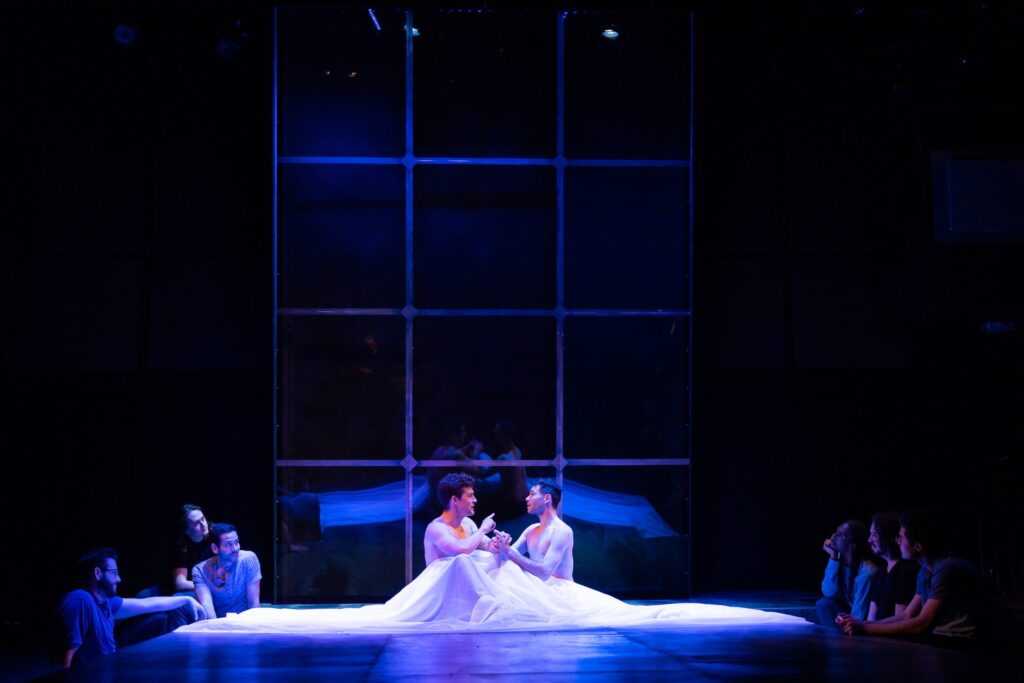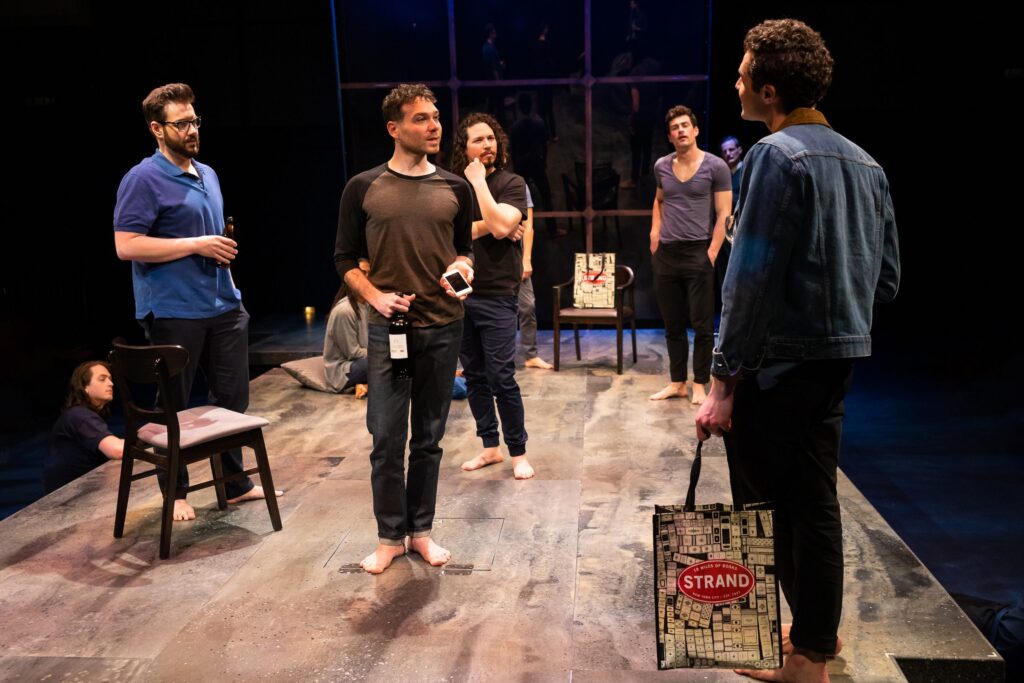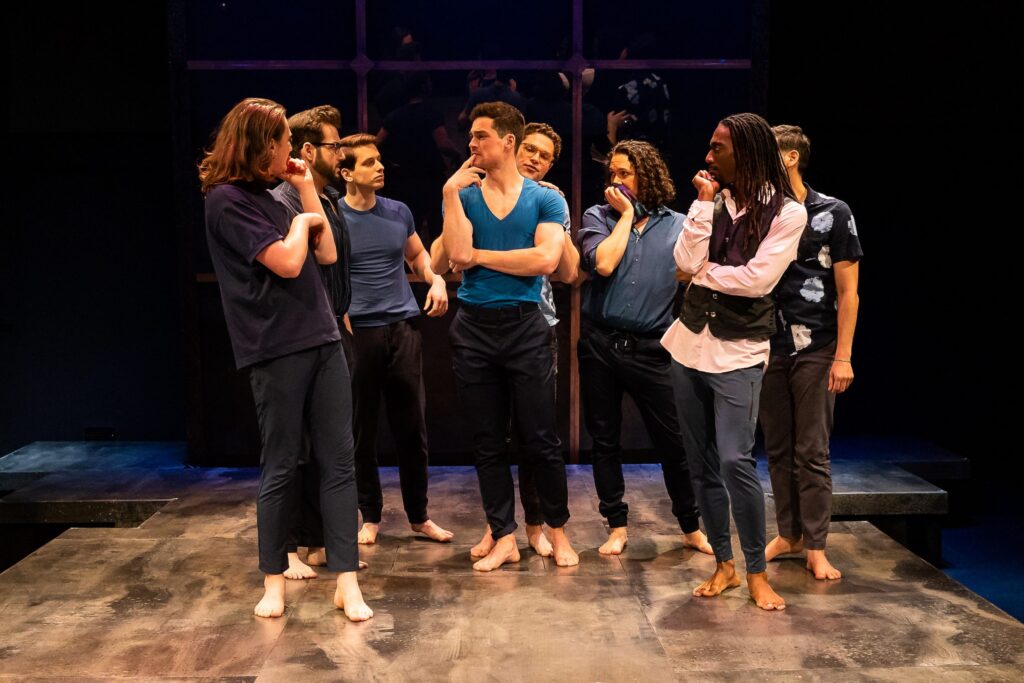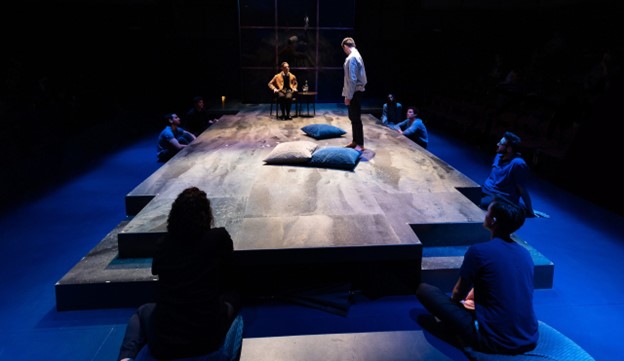
by Julie-Anne Whitney
‘The Inheritance’ – Written by Matthew López; directed by Paul Daigneault; movement and intimacy direction by Yo-El Cassell; scenic design by Cristina Todesco; costume design by Charles Schoonmaker; lighting design by Karen Perlow; sound design by Dewey Dellay; stage-managed by Thomas M. Kauffman. Produced by SpeakEasy Stage Company at the BCA/Calderwood Pavilion through June 11, 2022.
Matthew López’s Tony Award-winning play, The Inheritance, loosely transposes E.M. Forster’s 1910 novel, Howard’s End, to 21st Century New York where Forster (a closeted gay man all his life) acts as a spiritual guide to a group of young gay men, teaching them the art of effective storytelling. The group then collectively narrates the fictional tale of three generations of gay men from different social and economic backgrounds whose lives become inexplicably linked by way of friendship, betrayal, loss, and love. The story they write follows 50-something billionaire real estate owner Henry and his long-time partner Walter, both of whom become emotionally tied to 35-year-old activist Eric, whose self-destructive playwright boyfriend, Toby, falls for their new actor friend, Adam. Toby ends up befriending and becoming lovers with a lonely 19-year-old sex worker named Leo, who later is saved by Eric’s unwavering kindness.
The scope of López’s two-part play is impressive, if not occasionally pretentious and indulgent. The topics range from the AIDS epidemic, marriage equality, homophobia, racism, poverty, and suicide, to literature, theater, fine art, family, sex, and love (and much more). The six-hour sweeping emotional saga is brimming with graceful, poetic language and sharp, biting dialogue. But it is also littered with page after page after page of third-person narration and actionless exposition which repeatedly slows down and sometimes entirely halts the plot from moving forward.

While The Inheritance does frequently touch on the social, political, financial, and racial divides within the queer community at large, the play primarily focuses on one particular group that we’ve seen many times before: mostly white, middle-class, well-educated, thin, effeminate, liberal gay men who have a lot of (and often talk about) sex. In a February 2020 article for The New York Times, López explained that he “wasn’t attempting to create a work of theater that spoke for the entire queer experience…Art can be expected to hold a mirror up to society, but it cannot be expected to hold a mirror up to every individual who is engaging with it.” To be clear, there is nothing wrong with wanting to tell this particular story. The material is often deeply moving and beautifully realized. But for a play that calls for more than six hours of your time and attention, it is not unreasonable to expect that there might be room there to tell a wider, more inclusive story.

Director Paul Daigneault’s wonderfully playful staging is paired perfectly with Yo-El Cassell’s skillful movement and intimacy direction and gives the production a highly professional feel. The dominant feature of Cristina Todesco’s versatile and deceptively simple scenic design is an intriguing floor-to-ceiling window that towers at an angle over a large central platform, reflecting back to the young men different versions of themselves, their past, and potential futures. Some characters look out the window and see possibility, others see pain and fear, and some appear to be trapped within the confines of the cold, rigid frame, forever seeing a distorted version of themselves that they cannot seem to change.
Actor Eddie Shields brings an emotional complexity to the leading role of Eric Glass. Jared Reinfeldt shines in the role of Toby Darling, finding nuance in the character’s aching fragility and paper-thin confidence. Boston University student Mishka Yarovoy makes clever, thoughtful choices in the wildly different roles of Adam and Leo. And Mark H. Dold brings incredible depth and heart to the roles of Morgan and Walter.

The play’s title refers to the many traits and experiences that our LGBTQ+ elders have passed on to successive generations. The story is as much about the inheritance of love, culture, and resilience as it is about inheriting the weight of shame, trauma, and oppression. The Inheritance’ asks us to consider our responsibility to past and future generations. It pushes for deeper conversations about addiction and inequality. It reminds us of the importance of storytelling and the ever-present need for compassion in a world that grows colder and harsher by the minute. Regardless of its imperfections, The Inheritance is an admirable achievement. We need more plays like this; plays that challenge the way we think about ourselves and each other, and that allow us to feel as much and as deeply as this one does. For tickets and information, go to: https://www.speakeasystage.com/

